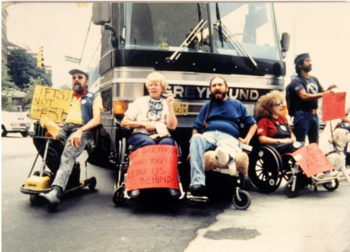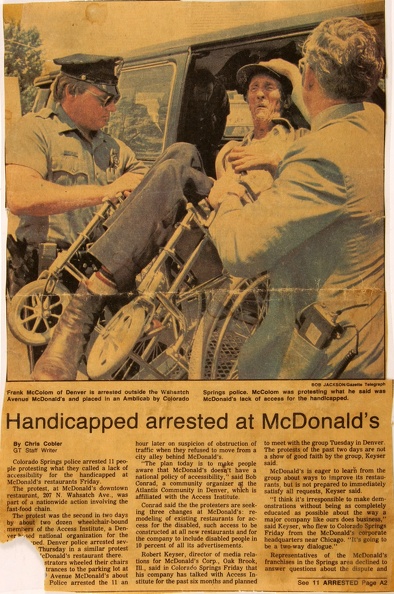ADAPT is situated within the complex and diverse disability rights movement. Disabled people have been subjugated by the US government and US culture since the US's inception, from forced sterilizations to freak shows to social ostracization. The disability rights movement began gaining momentum in the 1960s, feeding off of the revolutionary energy of the civil rights movement and mounting tensions between disabled people and the US government (especially veterans). ADAPT called its fight for accessibility “Our Selma”, and it is through collaborations with the civil rights movement that ADAPT began and remains highly intersectional. Disability rights groups sought legislation prohibiting discrimination based on ability status following the 1964 passage of the Civil Rights Act. Eventually, disabled people and disabled allies came together to advocate the passing of the 1973 Rehabilitation Act, which granted disabled people some civil liberties and protection from discrimination. ADAPT used this legislation to advocate for more comprehensive legislation and reinforce its position that accessibility is a constitutional right. Together with other disability rights groups, ADAPT lobbied for the passing of the Americans with Disabilities Act (ADA) that mandated accessibility accommodations and prohibited the discrimination of disabled people. Following the passing of the ADA, ADAPT focused on its implementation, ensuring that businesses and the government were following the law. However, institutional discrimination continues, with Nancy Fulco, an attorney with the Chamber of Commerce, declaring, “equal opportunity for the disabled is wonderful. Nobody is going to argue with that, but the practical realities are that there will be large costs associated with that.” Because of its high-profile actions, ADAPT has emerged as one of the most well-known disability rights groups.
Today, within the disability rights movement, there are lingering questions- Who is considered disabled? How do we define disability? Is it ethical to treat a disability as something to be “fixed”? Should allies be allowed to identify as disabled? There are also emerging questions, especially with the advent of new technology. For example, should people choose to abort fetuses with disabilities? Could a person choose not to “fix” their disability even if a cure was available? ADAPT must address these evolving questions and its evolving position within the movement.
Early History
The history of ADAPT must begin in 1974, 9 years before the group’s initial founding. Fed up with being relegated to nursing homes despite their young age, a group of disabled people in a Heritage House in Denver, CO, along with Rev. Wade Blank, began to design truly independent and choice-based programming in the homes. However, the capitalist and bureaucratically-entangled nature of homes was fundamentally at odds with the group’s goal of “allow[ing] every disabled individual, regardless of the extent of their disability, the same rights and responsibilities of their non-disabled peers”. When the state of Colorado would not provide the group with funding they needed to live in their homes and in the wake of the negligent death of Patrick Smith, a Heritage House resident, they sued (Smith v. O’Halloran) and used the money awarded to found the Atlantis Community, the second independent living community of its kind.
The community was exceptionally successful in providing disabled people with a choice of living that was not institutionalizing, infantilizing or overly-limiting. However, one of the principal obstacles to members of the community’s independence was fundamentally institutional- the inaccessibility of city buses. Tensions rose to an all-time high on July 5, 1978, when a collection of Atlantis Community members also known as “The Gang of 19” physically blocked buses from completing their routes, demanding that the Regional Transportation District (RTD) provide buses with lifts for disabled people, filling the street with chants of “We will ride!”. These protests largely succeeded in making Denver’s public transit systems more accessible.
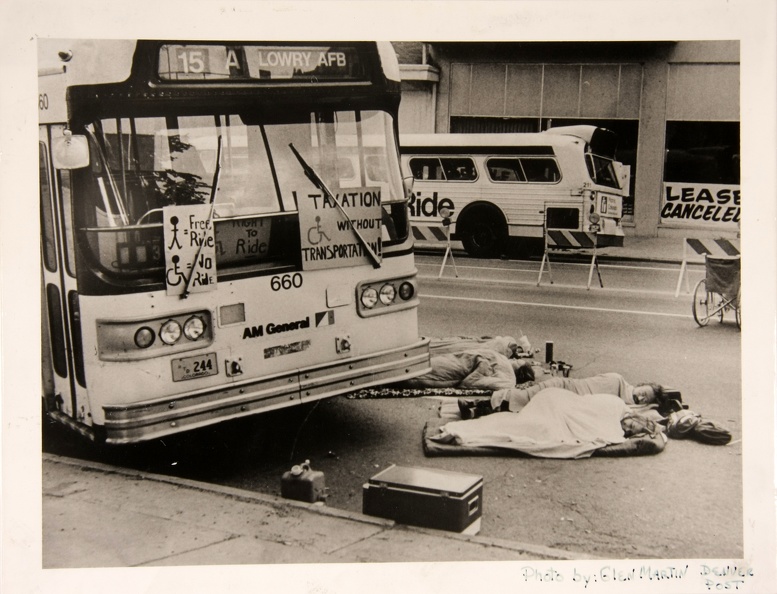
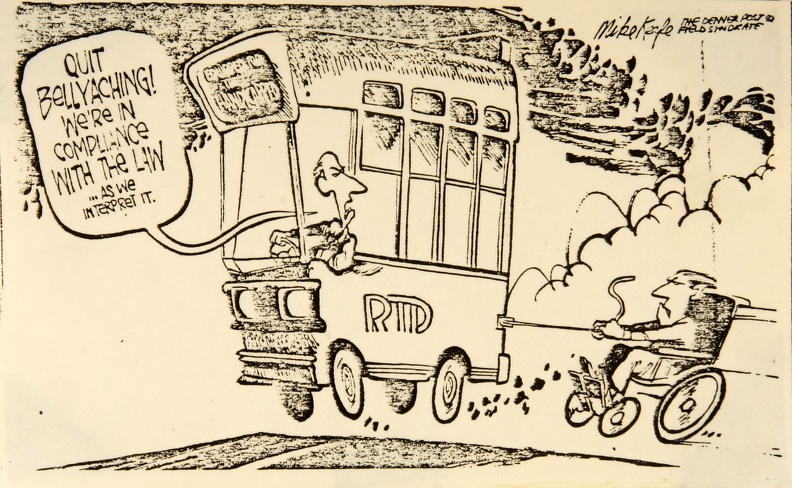
ADAPT was Born/ Following the APTA
“The Gang of 19” engaged in increasingly more frequent protest actions in the coming years, including sledgehammering concrete to protest the lack of accessible curbs and occupying city official offices to demand more comprehensive education services. The Gang of 19 eventually decided that their radical activist actions should be attributed to a dedicated protest group, so Americans Disabled for Accessible Public Transit was born in 1983. The group protested the American Public Transit Association (APTA) at their annual convention in Denver by using their wheelchairs to block entrances to the Hilton hotel where the convention was occurring. Attempts for reconciliation with APTA leaders were unsuccessful.
These protests gave ADAPT its first national press, and activists from other states travelled to Denver to participate. When Colorado Gov. Richard Lamm announced he was against improving bus accessibility the following year, and supported Department of Transportation legislation that paralleled “separate-but-equal” school rulings, ADAPT travelled to Washington, D.C. to protest the national APTA conference. Protesters blocked buses and convention entrances and many were arrested, but the APTA refused to change its policies.
ADAPT persisted, and protested the 1985 APTA Executive Committee meeting in San Diego, CA and the Western Regional Conference in San Antonio, TX, using similar tactics. The APTA agreed to vote on a resolution mandating transit systems provide handicapped-accessible buses, but the resolution did not pass, resulting in more bus blockades by ADAPT. ADAPT simultaneously protested the San Antonio VIA Metropolitan Transit system’s use of vans instead of implementing accessible buses, blocking buses and holding VIA employees hostage in their office.
Similar protests and marches against the APTA occurred in Los Angeles, Cincinnati, and Detroit from 1984-1986, with Rosa Parks initially leading the Detroit action (However, it should be noted that once ADAPT used tactics like inciting police violence, Parks withdrew her support due to conflicts with her foundation for civil rights). ADAPT also protested Greyhound buses and bus-engineering trade shows using the same civil disobedience-inspired tactics. Anti-APTA protests continued to occur in Phoenix, San Francisco, St. Louis, Reno, and Atlanta from 1987-1989, but it soon became obvious to ADAPT members that a federal accommodations law was an important step in forcing the APTA to mandate accessibility for the disabled.

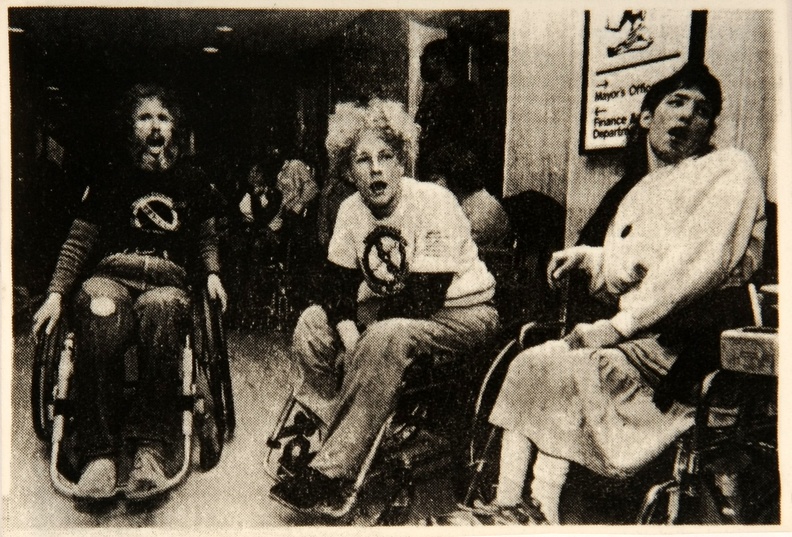
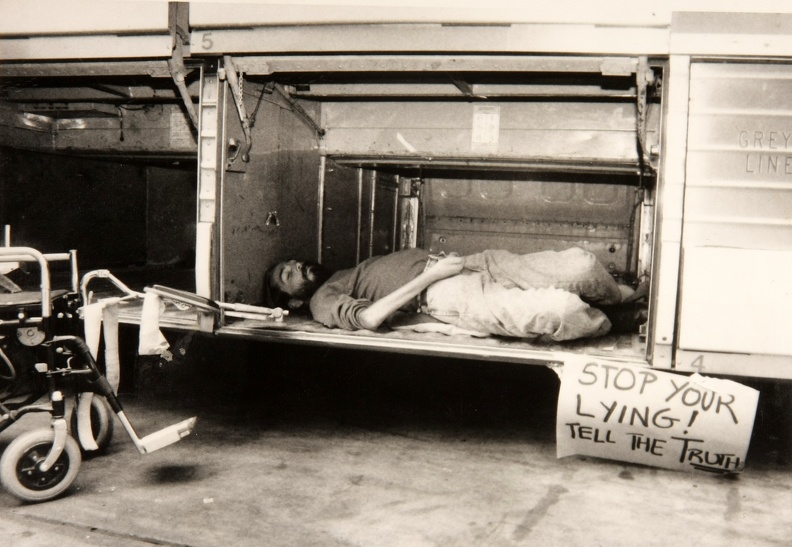
McDonald’s Campaign
One of the group’s first national campaigns occurred in McDonald’s restaurants across the nation. In 1983 and 1984, ADAPT protested the fixed tables and chairs, handicap-inaccessible bathrooms, and lack of wheelchair ramps in McDonald’s locations by blocking, occupying and/or picketing the stores, and in a few cases, protesters were arrested, Eventually, ADAPT organizers met with regional McDonald’s corporate officials, asking for more accessible new restaurants, more disabled representation in marketing, and the eventual retrofitting of existing restaurants to make them more accessible. When McDonald’s released a statement following this meeting, ADAPT found it inadequate because it claimed that McDonald’s was not responsible for its franchisees’ choices. While McDonald’s claimed it had always taken measures to be accessible to disabled people, the increased accessibility of its newer stores was largely attributed to ADAPT.
ADAPT v. Burnley
ADAPT, along with other disability rights groups and other intersectional groups like AIDS patient rights groups and veterans rights groups, backed the proposed Americans with Disabilities Act (ADA) as early as 1986. However, a much lesser-known legal victory (in ADAPT v. Burnley) was achieved by ADAPT, coalized with eleven other disability rights organizations, before the ADA was passed. On February 13, 1989, the US Court of Appeals overturned a previous District Court of Appeals ruling that paratransit systems were constitutional, and required buses to be made accessible. Following the ruling, ADAPT protested the Department of Transportation (DOT) and Urban Mass Transportation Administration (UMPTA) nationwide to keep them from appealing. ADAPT secured support for this movement from a few congressmen who pressured the Bush administration to not appeal the ruling, and no appeal was lodged. Note: After their goal of mandate accessible public transit was achieved, ADAPT changed its name to Americans Disabled for Attendant Programs Today.
Wheels of Justice
Simultaneously to the ADAPT v Burnley ruling, the ADA passed through the Senate in 1989. However, it stalled in the House of Representatives. To encourage its passing, ADAPT organized a Wheels of Justice protest march in Washington, D.C.. A further obstacle was the Bush administration’s reluctance to fully endorse the bill. While the Bush administration initially supported the ADA, its provision of harshly penalizing businesses that did not comply with the new regulations was not supported by the Republican Party’s neoliberal values. Protesters dressed in Revolutionary War costumes and some crawled up the steps of the Capitol building in what became known as the “Capitol Crawl”. Over 1500 people demonstrated, and 104 people were arrested, and when ordered to register for probation, discovered that the building where this registering occurred was inaccessible to them, and sued the DC court system. When further efforts to get the House to pass the ADA went unheeded, ADAPT occupied House offices. The bill finally cleared the House, and on July 26, 1990, the ADA was signed into law by President Bush. The bill banned discrimination of disabled people in the workplace and guaranteed accommodations for public services like buses, among other provisions. Accordingly, in 1990, the DOT put in place a new regulation that buses must be made accessible, representing a major victory for ADAPT.
Olmstead Decision
In 1999, the Olmstead vs. L.C. and E.W. decision mandated that under the ADA, those with mental illnesses could not be institutionalized, and should be allowed to live in their home community. ADAPT supported this decision, but little was done to enforce it.
MiCASSA
In 2002, ADAPT authored the Medicaid Community Attendant Services Act (MiCASSA), which allowed Medicaid recipients to choose whether to spend their Medicaid funds on nursing homes or in-home attendants, who ADAPT believes grant disabled people more individual agency. The existing Medicaid system was fundamentally discriminatory against disabled people, and forced people into institutional homes that granted them very little independence. When MiCASSA was tabled due to the strength of the nursing home lobby, ADAPT members blocked governor’s vehicles at the 2002 National Governors Association (NGA) meeting in Boise. When MiCASSA was again stalled, ADAPT protested in the hotel lobby of the NGA meeting the following year in Indianapolis, only gaining access to the hotel because they purchased rooms and passed police barriers. When the Executive Committee of the NGA refused to meet with ADAPT leaders, and, as a result, ADAPT blockaded the hotel entrances to prevent the governors from attending a dinner. However, no resolution was ever reached, so over 500 ADAPT members traveled to Seattle for the 2004 NGA meeting. ADAPT held a rally in a park highlighting the pitfalls of Medicaid-mandated long term care then occupied the hotel and surrounding streets where the NGA meeting was taking place. Pennsylvania Governor Rendell agreed to bring the resolution to the NGA floor, and it was passed at the 2005 NGA. However, MiCASSA remained unpassed for several years, and was then rebranded as the Community Choice Act.
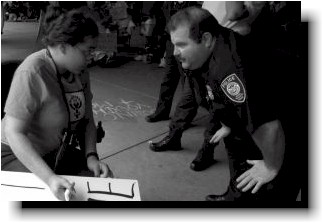
Olmstead Revisited
In 2009, ADAPT released a plan to advocate for enforcement of the Olmstead ruling, principally through its Community Choice Act. This included contacting lawmakers, creating ways to identify those at risk of institutionalization, and improving resources like transportation and housing for improved community integration. ADAPT’s actions played a role in the renewed push for the enforcement and implementation of the Olmstead ruling by the Civil Rights Division of the ADA, and President Obama’s declaration of 2009 as the “Year of Community Living” (However, Obama refused to mention the Community Choice Act, which ADAPT requested be included). The Community Choice Act remains unpassed.

Graham-Cassidy Amendment Opposition-2017
In 2017, following the election of Republican President Donald Trump and the achieving of Republican majorities in the House of Representatives and Senate, the Republican Party set about repealing President Obama’s Affordable Care Act (ACA). The ACA conferred disabled people benefits that the Republican Graham-Cassidy bill would slash. ADAPT activists initially protested the bill by occupying local GOP senator offices. However, as the bill came before Congress, ADAPT traveled to Washington, D.C. to occupy the Senate hallways and offices of Republican senators. Protesters were removed from Senate hearings and arrested in striking images that received national attention, and ADAPT garnered further noteriety on Twitter with the hashtag #ADAPTandRESIST. ADAPT succeeded in coercing some Republican senators to withdraw support from the bill, and Sen. Mitch McConnell withdrew the bill from the Senate as a result. This was a major victory for ADAPT; however, in January 2018, Congress partially repealed the ACA, and legislation is currently in Congress that, if enacted, will slash Medicaid funding. ADAPT continues to protest GOP senators on healthcare bills.
/cdn.vox-cdn.com/uploads/chorus_image/image/55394873/699840802.0.jpg)
#StopTheShock- The Judge Rotenburg Center Protest
Today, one of ADAPT’s principal goals is the shuttering of the Judge Rotenburg Center (JRC). The JRC is an institution depicted as a “school” for disabled people, and it subjects its residents to painful electric shocks as a part of “aversive therapy”. ADAPT organizers view the JRC as a clear violation of the ADA and Olmstead decision, and, as a result, have demanded that Food and Drug Administration (FDA) Director Dr. Scott Gottlieb order its closing and ban the devices that administer the shocks, called guaduated electronic decelerators (GEDs, which have been denounced by the UN as torture devices). ADAPT staged a 12-day Camp "ADAPT Stop the Torture” occupation of the space outside of Director Gottlieb’s apartment from March 9-March 20, 2018. During this period, rallies, chants, signage, and a theatrical performance which compared the JRC to a grotesque Oz from Wizard of Oz. A social media campaign with the hashtags #StopTheShock and #StopTheTorture was also launched on Twitter, with ADAPT members mentioning President Trump and imploring him to demand that Gottlieb outlaw GEDs. Neither the President nor Gottlieb made a statement. ADAPT members also met with New Jersey Congressman Chris Smith, who agreed to write legislation prohibiting the use of GEDs, and this process is ongoing.
For a day-by-day account of the occupation, see John Zangas’s article, “‘Stop the Shock’: FDA Director’s Home Besieged by Disability Rights Activists”
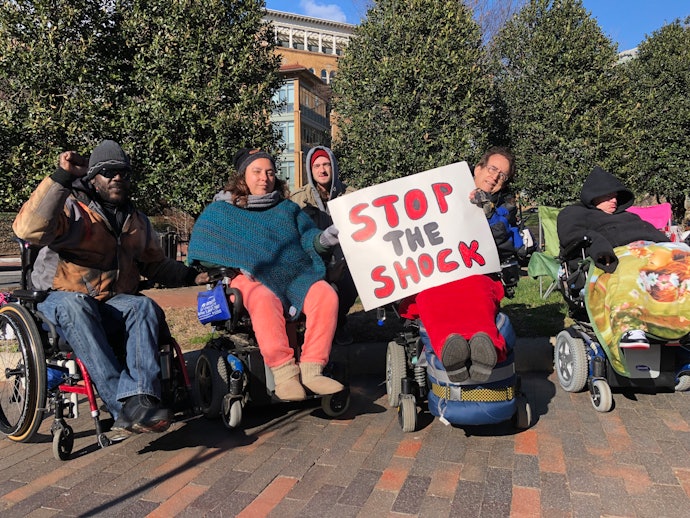
Most members of ADAPT are oriented with the left, especially recently, with the GOP's harmful cuts to the ACA, but not fully aligned with the Democratic Party, as Democrat Presidents and Congresses have not endorsed the level of equality for disabled people that ADAPT demands. ADAPT typically puts party affiliations aside and supports the candidates that more closely align with their mission, such as their praise of Republican Congressman Chris Smith in his vow to close the Judge Rotenburg Center. There is a pseudo-anarchistic and anticapitalistic current within ADAPT, because many believe that the ties between industries like the nursing home, medical supply, and long-term care industries and the government are at least partially responsible for the lack of legal progress for disabled people. However, ADAPT members who participate in the occupying action must negotiate the tensions between organizing outside of the state that does not treat them as equal and organizing to achieve some (but not all) of their goals.
ADAPT is composed of a national office with over 30 local groups located around the US, and each ADAPT group has a contact.
When participating in an action, protesters are divided into 4-6 Color Teams (called this because each team wears a different colored flag on their person or wheelchair) with 5-7 Color Leaders per team. Color Leaders ensure that their team is communicating effectively. 8-12 Day Leaders (2 per color team) liaison between Color Teams. When Day Leaders meet and make decisions, the information is disseminated to the Color Leaders, and the Color Leaders give the information to their team members and solicit feedback.
Demographically, ADAPT is a truly intersectional group, stating in their Activist Handbook, "Our siblings who are Black, People of Color (POC) or members (or perceived to be members) of the Lesbian, Gay, Bisexual, Trans, Queer (LGBTQ) community may be targeted because of racial, homophobic or transphobic bias. It is extremely important that ADAPTers are aware of this and watch out for each other." ADAPT welcomes able-bodied allies in addition to disabled members.
For more information on how ADAPT organizes its actions, see ADAPT's Activist Handbook.

